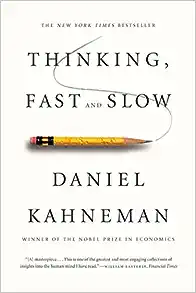 Inglés
InglésThinking, Fast and Slow
Daniel KahnemanLista de Espera
Disponible en 1-7 días
Cotizar Título
Confirmar Disponibilidad para Compra
"Thinking, Fast and Slow" is a book written by Daniel Kahneman and published in 2011. In this book, Kahneman, a Nobel laureate in economics, presents a comprehensive exploration of the two distinct systems of thinking that drive human decision-making and judgment.
The two systems referred to in the book's title are as follows:
System 1 (Fast Thinking): This system is characterized by quick, automatic, and intuitive thinking. It operates effortlessly and without conscious effort. It's responsible for making snap judgments, recognizing familiar patterns, and responding to immediate stimuli. However, it's prone to biases and errors due to its reliance on heuristics (mental shortcuts).
System 2 (Slow Thinking): This system involves deliberate, analytical, and conscious thinking. It requires effort and mental resources to process information, solve complex problems, and make rational decisions. While it is more accurate and systematic, it is slower and often overridden by System 1 due to the brain's tendency to conserve energy.
Kahneman presents a wide range of research findings and examples to illustrate how these two systems interact and influence our everyday choices. He explores cognitive biases, such as the availability heuristic (relying on readily available information) and the anchoring effect (being influenced by initial reference points), which can lead to systematic errors in judgment.
The book also discusses the concept of prospect theory, which explains how people assess risks and make decisions based on potential gains and losses, rather than objective outcomes. Kahneman delves into the psychology of happiness and how our experiences are often shaped by our memories of peak moments and the way they end.
One of the central themes of "Thinking, Fast and Slow" is the dichotomy between intuition and rationality. Kahneman challenges the assumption that humans are purely rational decision-makers, highlighting how cognitive biases can lead us astray. He emphasizes the importance of recognizing these biases and developing strategies to overcome them.
In summary, "Thinking, Fast and Slow" provides a comprehensive overview of the cognitive processes that drive human thinking and decision-making. Kahneman's insights have profound implications for understanding how people perceive the world, make choices, and navigate complex situations, making it a highly influential work in the fields of psychology, economics, and decision science.